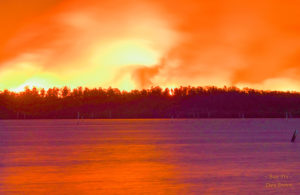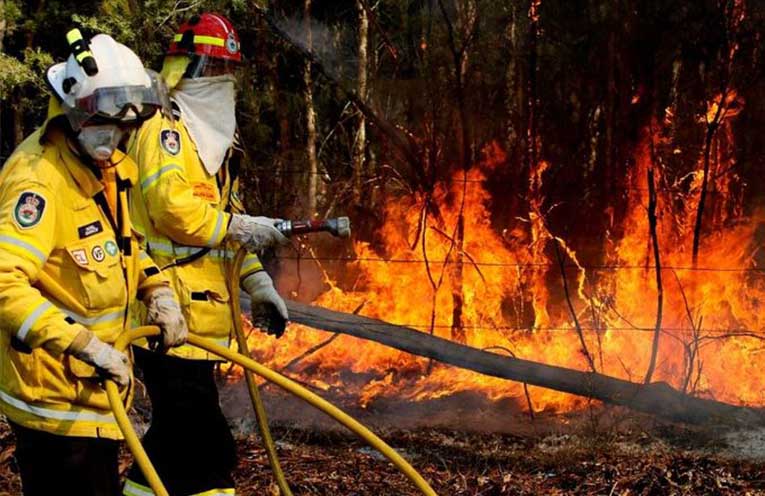With the Rural Fire Service (RFS) declaring dangerous fire conditions for tomorrow (Tuesday 12 November 2019), Premier Gladys Berejiklian has announced a State of Emergency.
The following message details important whole-of-government information for the people of New South Wales. Please share the information below with family and friends.
RFS:
Fire danger
We are facing an unprecedented level of bush fire danger. A catastrophic fire danger rating has been issued for the Greater Sydney, Greater Hunter, Illawarra/Shoalhaven areas.
Catastrophic is the highest level of bush fire danger. Homes are not designed to withstand a fire in these conditions.
Any fire that starts and takes hold will threaten lives and homes.
While there are large population centres under catastrophic conditions, there are also large areas of Severe and Extreme fire danger.
This includes areas where we already have dangerous fires burning – and these conditions will be worse than those experienced last week.
A Total Fire Ban is in place for the whole of the state.
Warnings
Stay up to date on fires in your area. People are urged to download the ‘Fires Near Me’ app: https://www.rfs.nsw.gov.au/
If you are threatened by fire, you need to take action to protect yourself. Do not be caught in the open.
Keep up-to-date with major fire updates: https://www.rfs.nsw.gov.au/
Under these conditions, some fires may start and spread so quickly there is little time for a warning, so do not wait and see.
There are simply not enough fire trucks for every house. If you call for help, you may not get it.
Do not expect a firetruck. Do not expect a knock on the door. Do not expect a phone call.

What to do
Start taking action now to reduce your risk.
Avoid bush fire prone areas. If your home is in a bush fire prone area, the safest option is to not be there.
Do not travel through bushland areas.
A safer location may be a large town or city, shopping centres or facilities well away from bushland. It may also be a designated ‘Neighbourhood Safer Place’.
A Neighbourhood Safer Place is designed as a Place of Last Resort in bush fire emergencies only. Please note that travelling to or sheltering at a Neighbourhood Safer Place does not guarantee your safety.
Your safest option will always be to leave early.
People with special needs, such as the elderly and people with a disability, should always leave before the threat of bush fire.
If it is unsafe to leave the area or stay and defend your property, and the path is clear, you should move to your pre-identified Neighbourhood Safer Place, or other safer location, prior to the impact of a bush fire.
Be aware that when you are travelling to your Neighbourhood Safer Place there may be heavy smoke and poor visibility.
It is important that you are familiar with the area. Gather at the Neighbourhood Safer Place location and remain there until the bush fire threat has passed.
The conditions at the Neighbourhood Safer Place may be uncomfortable and you may be affected by heat, smoke and embers.
Water, toilets and food may not be available at the Neighbourhood Safer Place and emergency service personnel may not be present.
Neighbourhood Safer Places are not intended for pets and livestock.
https://www.rfs.nsw.gov.au/
For more information about the fires, contact the Bush Fire Information Line – 1800 679 737
Bureau of Meteorology (BoM):
A strong cold front will move through NSW on Tuesday, with hot, dry and gusty conditions ahead of the front generating very dangerous fire conditions over the ranges, slopes and coast.
All people in bush fire prone areas in NSW need to have a bush fire plan, remain vigilant, and monitor warnings and messages from the RFS.
Damaging wind gusts are also possible over parts of the southern ranges, Illawarra, Sydney coastal fringe and Hunter Coastal Fringe on Tuesday. Areas of raised dust are also forecast west of the Great Dividing Range, and there is a change that this system will bring dust to some coastal districts.
Evacuation centres:
Evacuation Centres are in place throughout fire-affected areas of the state. The most up-to-date information is available at https://www.emergency.nsw.gov.
The NSW Police Force keep their Facebook page up to date with evacuation centres that re open. Please monitor https://www.facebook.com/
Education:
Hundreds of schools across the State will be closed. Affected schools have been notified; however, an up-to-date list can be found via the following sites: https://education.nsw.gov.au/
https://twitter.com/
https://www.facebook.com/
Transport:
Motorists should delay all non-essential travel.
Many roads remain closed due to bush fires. Be prepared for conditions to change quickly and roads to close suddenly.
If you need to travel, also make sure you’ve got water, food, supplies and a full tank of fuel. Make sure your mobile phone is fully charged before you set out.
If you’re already travelling when a bush fire starts, follow the directions of emergency services personnel.
Due to fire activity, both man and local roads may close without warning. For the latest information on road closures, check www.livetraffic.com or download the Live Traffic NSW app or call 132 701.
All North Coast Train Services, from Sydney to Casino and Sydney to Grafton and their return trips have been cancelled until Wednesday due to the bush fires. Passengers are advised to delay any non-essential travel to the bush fire-affected areas.
For the latest information on public transport, check transportnsw.info or download a transport app or call 131 500.
NSW Health
If you’re preparing to leave, make sure you pack your medications, including those in the fridge.
Smoke can cause health problems, particularly for people with pre-existing lung and heart conditions like asthma, emphysema, angina or heart failure.
Avoid outdoor physical activity if it’s smoky, particularly if you have a pre-existing condition like asthma.
People with asthma should follow their asthma management plans.
If you have asthma, make sure you keep your reliever medication close to hand.
If your reliever medication has run out or is passed its use-by date, you can buy a new one from the pharmacy without a prescription.
You can reduce exposure to smoke by staying indoors with the doors and windows shut. Air conditioning can help to filter out smoke that gets into your house.
The following link contains a fact sheet with information about what to do if fire retardants have been used on your property and may have affected your private drinking water supply. https://www.health.nsw.gov.au/
NSW Ambulance
People with any respiratory issues or who are particularly vulnerable can be the first to feel the effects of smoke which may aggravate their existing condition. Even healthy adults and children can be impacted by the effects of heavy smoke which can result in lung irritation.
These conditions can have a serious impact on your health and it is important to remember that our bodies have to work extra hard to cope or cool down. Ensure you stay hydrated and pay particular attention to any symptoms (dizziness, headaches, racing pulse or nausea) of heat related illness.
Be aware of potential hazards such as embers, falling debris, damage to surroundings and reduced visibility which can cause injury. Paramedics are urging people in fire affected areas to wear any form of eyewear and loose clothing to cover your skin to assist in reducing any incidental injury.
NSW Ambulance recommends if anyone sustains any form of burn they should cool the affected area immediately with water – ideally running water – for a minimum of 20 minutes (for eyes ensure you flush the eye) and seek medical attention.
We need people to really take care of themselves. If you have a pre-existing medical condition make sure you have all your medications with you and readily available at all times.
NSW Ambulance is always here to help – never be afraid to call Triple Zero.
Agriculture & Animal Services:
Include your animals in your bush fire plan.
If you can, take your animals with you. Assistance from AASFA is available if you attend an evacuation centre.
For those impacted and seeking assistance for emergency fodder, emergency water (for immediate animal welfare cases only) or animal assessment (resulting from the fires) please contact the AASFA Hotline on 1800 814 647.
NSW Environment Protection Authority (EPA):
Emergency response
Large volumes of waste have been generated from the bush fires and the EPA will work with local authorities to ensure the waste can be appropriately moved and disposed of when it is safe to do so.
The EPA is also monitoring impacts on its licensed premises and providing advice to licensees about how to manage their sites given the challenging conditions.
The community can report environmental concerns to the Environment Line 24/7 on 131 555.
Recovery
The State Emergency Recovery Controller has indicated a State Recovery Committee will be established to coordinate the significant recovery effort resulting from this event. The EPA will play a key role on the state level and related regional level committees which are likely to be active for the remainder of the bush fire season.
Utilities:
Keep at least 8 metres away from fallen power lines or objects that may be energised, such as fences.
Report fallen power lines to either Ausgrid (131 388), Endeavour Energy (131 003), Essential Energy (132 080) or Evoenergy (131 093) as shown on your power bill.
NSW Police:
The NSW Police are working hard to assist people in their local communities.
For general information or assistance about the bush fires please call the Public Information Inquiry Line on 1800 227 288.
For non-urgent assistance please call your local police.
We encourage all people in and around fire affected areas to register online with the Red Cross operated Register Find Reunite site at https://register.redcross.org.
Anyone who sees suspicious or illegal behaviour is urged to contact police via Crime Stoppers on 1800 333 000 or https://nsw.crimestoppers.com.
Finally, if you require emergency assistance please call 000.

(photo courtesy of Nine news)
